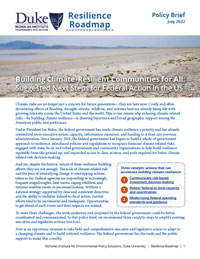Under President Biden, the federal government has made climate resilience a priority and has already committed more executive action, capacity, information resources, and funding to it than any previous administration. And yet, despite the historic nature of these resilience-building efforts, they are not enough as effects of flooding, drought, storms, wildfires, and extreme heat grow more intense across the United States and the world. This policy brief follows up on Resilience Roadmap’s original recommendations to suggest three catalytic steps for amplifying existing executive and legislative resilience-building actions: communicating risk-based investment decision-making, bolstering federal-to-local capacity and coordination, and modernizing federal spending standards and guidance. The brief draws on the expertise of the Resilience Roadmap steering committee, a multidisciplinary group of climate and policy practitioners, to provide guidance on how the federal government can build on its accomplishments and meet this critical moment head on.
Nicholas Institute for Environmental Policy Solutions
Publisher


